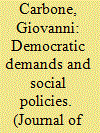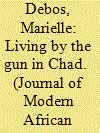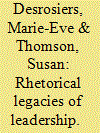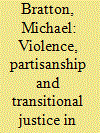| Srl | Item |
| 1 |
ID:
106964


|
|
|
|
|
| Publication |
2011.
|
| Summary/Abstract |
It is commonly assumed that the advent of democracy tends to bring about social welfare improvements. Few studies, however, have examined empirically the impact of third-wave democratisation processes on social policies in developing countries, particularly in sub-Saharan Africa. Through a diachronic comparison, this paper examines the effects of Ghana's democratisation process on the evolution of its health policy. It shows that the emergence of democratic competition played an important role in the recent adoption of a crucial health reform. A policy feedback effect on politics and a process of international policy diffusion were additional but secondary factors.
|
|
|
|
|
|
|
|
|
|
|
|
|
|
|
|
| 2 |
ID:
106968


|
|
|
|
|
| Publication |
2011.
|
| Summary/Abstract |
Based on seven months of fieldwork research, the present article explores the nature and 'reach' of the state in post-genocide Rwanda, and its effects on decentralisation, participation and assertion of voice at the local level. Rwanda as a case of a 'strong' African state is explored through a number of lenses: the vertical structure (administrative and information apparatuses of the state); the lateral structure (multiple responsibilities, imihigo, indirect control); the spectrum of state-led 'local' activities; and, last but not least, the 'counterweights' to the state. The article suggests an increasing penetration of state in terms of surveillance as well as exactions (couched in terms of umusanzu or contribution) and control over voice at local level. Decentralisation amounts to mere 'dispatching of control', making central power more, not less, effective.
|
|
|
|
|
|
|
|
|
|
|
|
|
|
|
|
| 3 |
ID:
106967


|
|
|
| 4 |
ID:
106965


|
|
|
|
|
| Publication |
2011.
|
| Summary/Abstract |
This article explores men in arms' conceptions of armed violence in a country which has been prone to a violent cycle of rebellion and repression. Based on ethnographic research in Chad, it analyses combatants' life trajectories in an unstable political environment and a militarised economy. It moves beyond rebellion towards an analysis of the most mundane patterns of the activities conducted by men in arms, to understand what is at stake beyond times and spaces of war. It argues that armed violence is an ordinary way of expressing contestation, as well as a practical occupation or métier, a French word that indicates a non-institutionalised profession.
|
|
|
|
|
|
|
|
|
|
|
|
|
|
|
|
| 5 |
ID:
106966


|
|
|
|
|
| Publication |
2011.
|
| Summary/Abstract |
Comparing pre- and post-genocide Rwanda, this article argues that clear continuities exist between the regimes of Juvénal Habyarimana and Paul Kagame. Both have projected a remarkably similar image of 'benevolent leadership'. Presenting themselves as harbingers of an 'improved' or 'new' Rwanda, both leaderships have claimed to be best able and willing to guide Rwanda along the right path to peace, security, ethnic unity and development. 'Benevolent leadership' in both periods has also served as a tool to try and shape regime relationships with international and domestic audiences. Internationally, each government has worked to promote Rwanda and its authorities as a good development partner. Domestically, these projections have served to establish norms of order and obedience. We argue that projections of 'benevolent leadership' have been a tool designed to win over the international community and discipline the Rwandan population.
|
|
|
|
|
|
|
|
|
|
|
|
|
|
|
|
| 6 |
ID:
106963


|
|
|
|
|
| Publication |
2011.
|
| Summary/Abstract |
What determines people's willingness to consider punishment for human rights abusers? This article investigates this question in the context of Zimbabwe in the aftermath of the country's violent presidential election campaign of June 2008. Based on a national probability sample survey, the paper shows that exposure to violence was reportedly widespread and that attitudes to transitional justice are mixed. In considering how to handle abuses, Zimbabweans weigh the pros and cons carefully and, recognising that peace and justice are difficult to obtain simultaneously, generally prefer the former. The article analyses the various factors that together predict a citizen's proclivity to claim transitional justice in its most demanding retributive form. Reflecting power relations, the results indicate that political partisanship is almost as important as individuals' personal experience of actual and threatened acts of violence.
|
|
|
|
|
|
|
|
|
|
|
|
|
|
|
|